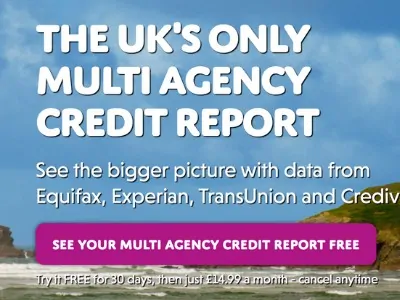Credit repair UK – How to improve your credit score UK
Trying to repair your credit in the UK? Looking to improve your credit score? You’re not alone. In the UK right now there are an estimated 18 million of us with what lenders would call ‘poor credit’.

I'm Steph, mum of three! 👋
Here, I share practical insights on making (and saving!) money. With a knack for budgeting and a passion for financial freedom, I've picked up lots of tips & tricks along the way. And I can't wait to share them with you here!

The reality of this is that people aren’t able to access the best rates of interest on loans, mortgages and credit cards. Depending on the seriousness of the poor credit, it’s possible people will struggle to secure any type of lending at all.
But there are ways to improve your credit score, allowing you access to cheaper lending. It’s not a quick process but the sooner it’s started, the sooner poor credit can be repaired.
If you’re in debt, have a read through this DEBT BUSTING post here.
✅ Check your credit score for FREE UK
The first thing to point out is that you don’t need to pay to access your credit file and check your credit score. It’s totally FREE by making use of free trials (just make sure you cancel within the agreed time frame or you’ll be charged!).
Checkmyfile allows a 30 day free trial, and handily checks all the three main credit reference agencies in the UK, Experian, Equifax and TransUnion.
The beauty of Checkmyfile for me is two fold. Firstly, it’s free, and 30 days is more than enough time have a look at and understand your credit file. Secondly, rather than signing up to all three credit reference agencies and then forgetting to cancel them all, Checkmyfile is a simple sign up process with a very easy to cancel process. Anyone else ever forgotten to cancel a subscription? Me too!
Signing up for a free trial with Checkmyfile is easy.
This YouTube video explains easily how you can do this. (See below for how to cancel your subscription after you’ve signed up if you need to).
✅ How often does Checkmyfile update?
Checkmyfile updates the credit agreements it holds on file as the lenders do, which is usually once per month. If you check your file just before the lender is about to update it, your information might seem a few weeks old. This is normal. Check back again in a few days and you should see an updated version of your file.
If you’ve updated the electoral role and are checking to make sure your current address is registered, give it at least a month to be updated.
Waiting for defaults, CCJ’s and other negatives from your credit to be updated shouldn’t take to long at all. As soon as the time limit is up on these, they should automatically drop off the end of your credit file.
If you’re checking to see if any of these have dropped off, a couple of days before the drop off date, sign up for a free trial and then you can double check they’ve gone.
✅ How to cancel Checkmyfile
Once you’ve signed up for your free trial, you might want to cancel your Checkmyfile subscription. If you choose to carry on, you’ll need to pay £14.99 monthly, which while might be good if you’re planning on monitoring your credit file over a longer period of time, but wouldn’t be necessary if you’re just wanting to check the informations correct and see what’s on there.
There’s a handy video on YouTube explaining how to cancel either your trial or a monthly subscription.
✅ What is a credit rating?
A credit rating is simply a way for lenders to access how you might behave if they were to offer you credit.
Any credit you’ve had in the past 6 years is recorded along with how you repaid it, and any outstanding credit you have is also recorded and lenders use this info to see how risky you are to lend to and to see if you can afford what you’re asking for, taking into account the credit you already have.
There is other information the credit reference agencies hold as well. Your address are kept on file, and any defaults or county court judgements (CCJs) are held on your file too.
Lenders generally take into account all the information when they’re making a decision to lend to you or not.
✅ What is a good credit score UK?
Credit score in the UK go from 0-999, with 0 being bad and 999 being excellent. Different agencies have different methods of scoring and consider different ranges to be ‘good’.
It’s worth remembering that these scores you see are just an indicator to you of how your credit score is doing. Lenders have their own criteria that you need to meet when applying for credit, and it’s perfectly possible that you can be turned down for credit when your credit score is high, or accepted if it’s a bit lower. This is because of all the different factors lenders take into account when accessing your application for credit.
✅ Checking your credit score before making a big purchase
When lenders see a large amount of applications on your credit record, it can indicate to them that you’re taking on too much credit. This of course makes them wary, so don’t apply for more credit than you need, and don’t keep applying if you get rejected. This will only make more credit rejections more likely.

Instead, what you can do is what’s known as a ‘soft search’ before you apply. What this means is that you can see the likelihood of being accepted for credit before you actually go ahead and apply.
And the best part? These soft searches don’t show up on your credit record the way they would if a lender was credit checking you. Why is this so good? You’ll only go ahead with an application you know you’ve got a good chance of being accepted for. While getting a good likelihood of being accepted is a good sign, it’s not 100% that you’d be accepted during a full application, but it gives you a good idea.
✅ Soft credit searches
If you’re looking to apply for credit, there is a great free soft search tool on Money Saving Expert’s website.
✅ What does credit scoring affect?
Having a good credit score makes credit cheaper. It means you can access:
- the lowest rates of interest on credit cards, balance transfers, mortgages, loans and car finance
- a better chance of being approved for the credit you want
- easier approval if you’re trying to rent a home
- higher credit limits on credit cards
When you’re not actively looking for credit, it’s a good idea to keep an eye on it and make sure no wrong information is being put on your credit record.
It’s common for mistakes to be make and inaccurate information to be recorded and it’s easier to sort this out if you’re on top of changes.
✅ How long does it take to improve your credit score UK?
Building your credit score in the UK is not an overnight process, and don’t believe anyone who says they can speed it up or have (accurate) negative records removed before they’re due to drop off anyway. There are a number of companies that offer these sort of services, and they’ll charge you for it. BUT….be very wary of these places.
How long building up your credit takes is dependant on the issues that are there in the first place. One or two missed payments shouldn’t cause you too many problems after a year, although they’ll still show up. The other end of the scale is county court judgements (CCJs) and these will cause you huge issues and take 6 years to drop off your credit record. So you’ll see, it depends on each individual case. Having something negative that’s quite small will obviously take less time to repair than major issues.
The best way to build your credit record if it’s dipped for whatever reason, is to start making regular on time payments to the credit you already have.
There are tips and tricks below for improving your score.
✅ Tips for improving your credit score UK
- Make sure you’re on the electoral role – part of a credit check is making sure the application isn’t fraudulent. One of the ways credit reference agencies do this is to verify where you live. The only way they can do this properly is to check the electoral role, the records held by your local council. Make sure you’re on it. Register here if you haven’t already.
- Make ALL payments on time – this is a catch 22 when you’re short of money, but it’s vital that you make all payments on time on the credit you already have. Missing payments, even being a few days late, negatively impacts your credit score, keeping your credit score lower than it could be. If you need some ways to make a little extra cash, we’ve got lots of ideas here to bring in some extra money!
- Space out your applications – lenders don’t like seeing loads of applications for credit within a short space of time, as it indicates you may be desperate for credit and having money problems. Spacing out your applications means they won’t have this impact on your credit score.
- Only apply for the credit you need & no more – one of the factors lenders look for when accessing your application is the overall amount you owe. They have a duty of care towards you and they shouldn’t lend more than you can reasonably afford. Owing a lot already might indicate to lenders you can’t afford to borrow more, so only borrow what you need.
✅ Using a credit card to build credit your credit history
If your credit history is poor and you’re now looking for a way to start building it, a credit card properly used can help you do this.
While it’s generally a good idea to stay away from credit cards if you can help it, in this case they can actually help you.
There are a number of lenders that offer credit cards with lower limits to those looking to rebuild their credit. Used with the soft search tool, you can see which one you’d likely be accepted for and avoid a credit application rejection on your file.
How do these cards help? They show a lender that you can borrow money and repay it on time, every month. It doesn’t have to be maxed out either (and shouldn’t be!) but putting £10 of food shopping each month and paying it off in full on time will go a long way to building trust with lenders again.
For an up to date list of ‘bad credit’ credit cards, see here.






